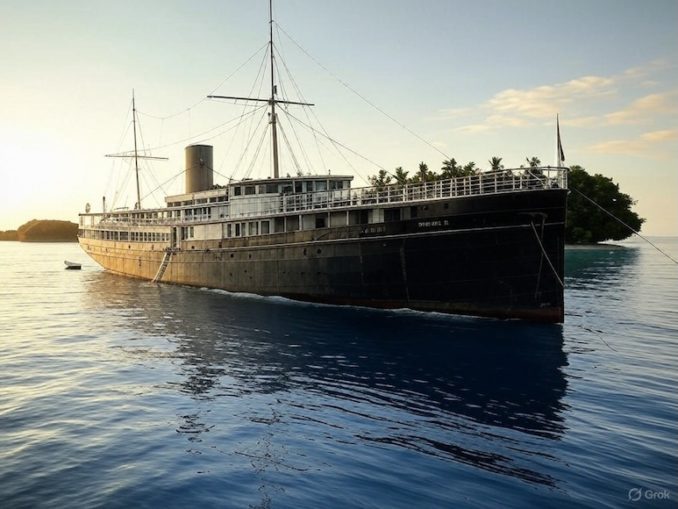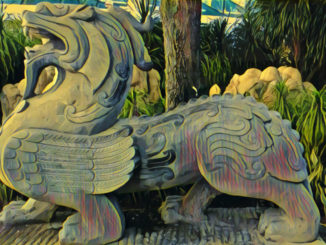
Under a waning moon, three furtive figures make their way towards the island’s Constance Bay. Silent, gaunt and burdened, they carry two canvas bags bearing scant rations and a few petty, pilfered provisions — enough for a short flight but not for survival. Their destination: the coast, with its useful fringe of bamboo jungle.
There, with rough hands and sharper desperation, they hew the bamboo and fashion it into a makeshift raft, tied together with the split cane which serves as an improvised rope in this distant outpost of Queen Victoria’s empire. Then they put to sea, drifting westward into the ocean, eyes set on a faint, flat strip of low-lying land (which the men took to be the mainland), visible from nearby Point Mouat.
Others had passed before them. Whispered legends spoke of the possibility of a cruel fate: of being swept southward into the endless seas, condemned to die of thirst and hunger. For the men were convicts, escaped from one of Her Majesty’s prisons on a distant settlement in the year 1891. Whatever crimes brought them here, desperation now drove them onwards.
The bay was that of Bengal, meaning, although they pushed off into tropical seas in the Northern Hemisphere, no landmass lay south of them until Antarctica. By grace, the raft headed westward and did indeed reach sight of land after some twenty miles of turbulent drifting. But here the ocean dealt its blow. Savage surf was breaking upon a fringing reef.
The current dragged them southeastward. Lashing their possessions, they slipped into the water to cling to the raft as it rose on the swell — the hope being its buoyancy might carry them into a placid lagoon they could glimpse beyond the reef. However, the waves were breaking upon a hefty crop of rock — one so high that parts of it remained dry no matter what the swell.
The raft shattered with the shock of impact. Two convicts were cast to the ocean and drowned in its depths. Only the third survived, scrambling bloodied across the jagged rock to the safety of a lagoon. Amidst washed-up clothing and bamboo wreckage, he waded to a beach onto which he staggered in relief.
Later, he would gather what remained of the bamboo, tying it into a crude shelter to sleep within. Exhausted and half-mad, he dreamed of pushing inland through dense, steaming jungle, hoping to reach (in his mind’s eye) a road that might lead him, faceless and free, to begin a new life in the anonymity of a teeming Indian city.
However, the native — most of all one who belongs to the convict class — is a naïve soul. Understanding little outside his village, he is prone to the superstitious assumptions of those like himself in the Bay’s island penal colonies — those who believe, without foundation based on anything approaching fact, that the Indian mainland lies within tantalising sight if one can only reach the coast at Constance.
***
Two weeks later, the heat lays heavy upon the Bay of Bengal, but the sea itself is as smooth as glass. The mail steamer Elphinstone finds herself anchored off the southern shore of an idyllic island — its white sands and nodding palms a vision from Eden itself. A gap in the reef allows for safe landing on a beach which a bounty hunter or lotus eater might look to with envious eyes.

Around noon, a detachment of the Suffolk Regiment would go ashore to explore the thick jungle that pressed behind the golden sands. A second party would follow at dusk. In the aftermath of subsequent events, a recollection arose of a warning being issued. If so, the ‘Tommies’, with an inbuilt inclination to laugh off such things, did not put themselves out on account of it and proceeded as planned.
One of the first sights to meet the eyes of the soldiers was the corpse of a Hindu on the edge of the water — pierced with arrows and with his throat cut. A close search along the shore followed: clothing was found bearing the numbers of convicts, bundles of bamboo lay bound with cane — likely the remnants of the raft — and in bushes on the fringe of the jungle, two tattered bags contained damp garments and soaking wet flour.
The marks of footsteps and signs of fresh fires suggested that a sizeable party camped near the shore and had only left close to when the Elphinstone anchored. For this was not the Indian mainland, but the Andaman Island of North Sentinel. The warning, now prurient, was of a place peopled by a tribe of Andamanese aboriginals who, though few, were very hostile to all comers. The fate of the escaped convict became clear.
The day after his arrival, and with his stash of rations ruined by salt water, he wandered along the shore — starved, salt-ravaged and searching for sustenance. A party of those aborigines must have come out from the jungle and shot several arrows into him. When he fell, they cut his throat, pulled the arrows out of his body and threw them into the sea for anyone who might be following him to find.
Said to be noble savages who wear only fibre strings around the waist, they have no use for clothes and left those of the convicts where they lay. Not being cannibals, they did not eat the body but left it to the elements while camping on the beach to see what else might come ashore for them.
Rumoured to understand the cries of birds and to be able to detect approaching vessels through scents on the wind, before the Elphinstone lowered its anchor, the aboriginals will have hid in the dense jungle beyond the shoreline. A foliage impenetrable to the inhabitants of the other Andaman Islands, let alone to the stout yeoman of Suffolk who, hours later, even if they could, dared not enter under the dark canopy of trees.
Besides the soldiers, several convicts were in the Elphinstone party. When news of the encounter reached Port Blair, every barrack and dockside tavern circulated a cautionary story for any would-be escapees or gentlemen of adventure in Her Majesty’s island dominions. And, though even the most well-travelled Puffin-of-the-world may struggle to believe such a thing, the internet and mass media warn of the same to this day.
One hundred and thirty-four years after that fateful spring encounter, the North Sentinel islanders remain one of a handful of uncontacted tribes left in the world. The unwary arrive at their peril as, to this day, few leave alive.
© Always Worth Saying 2025



